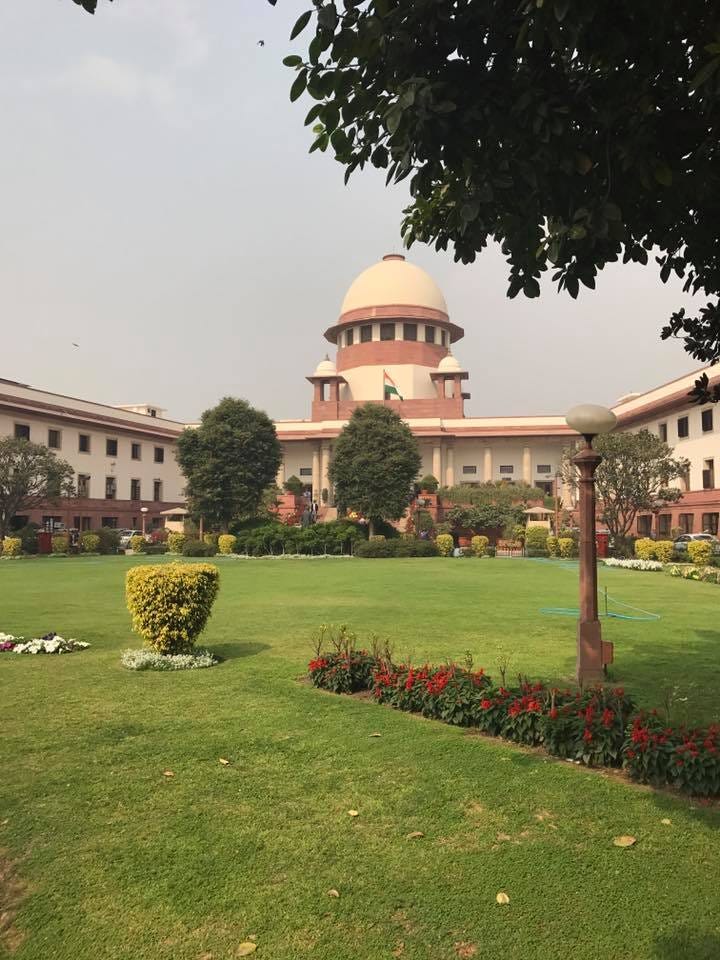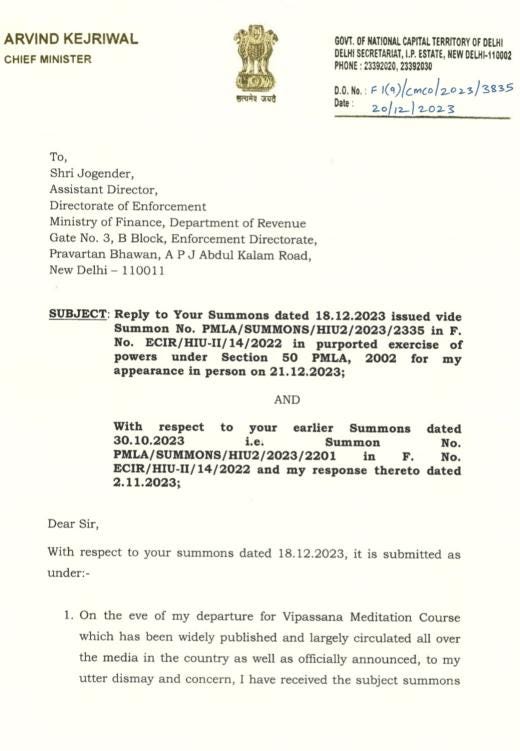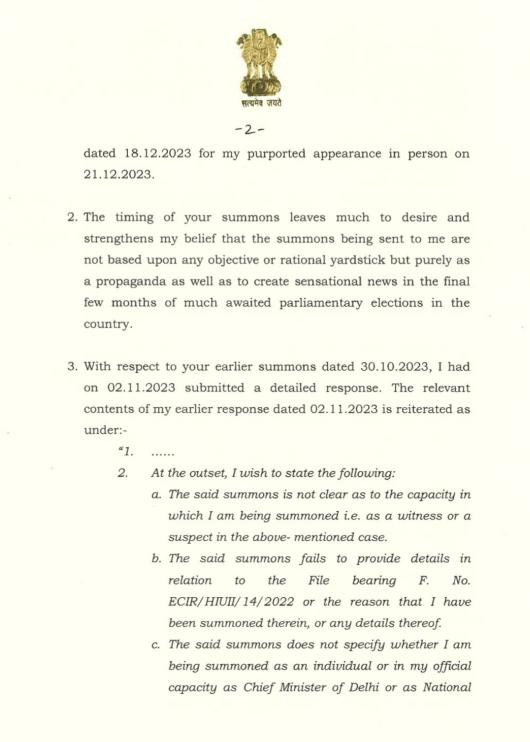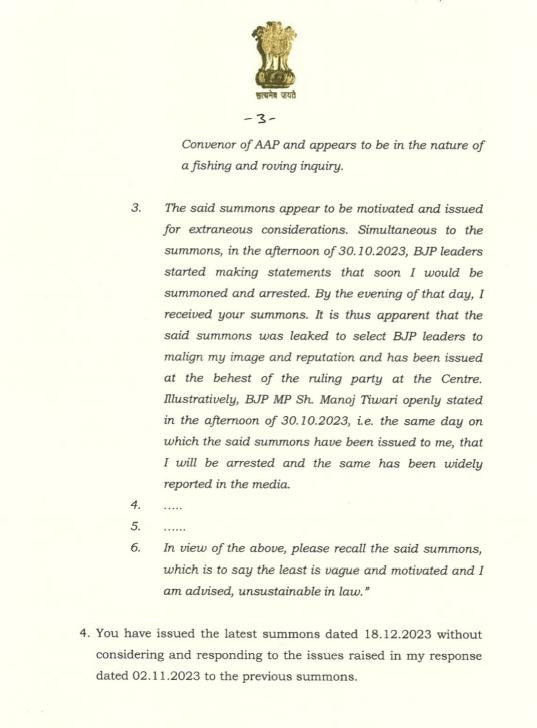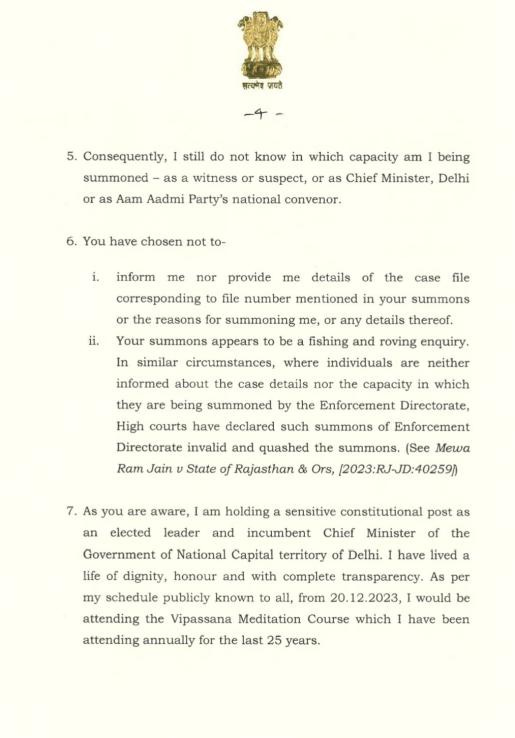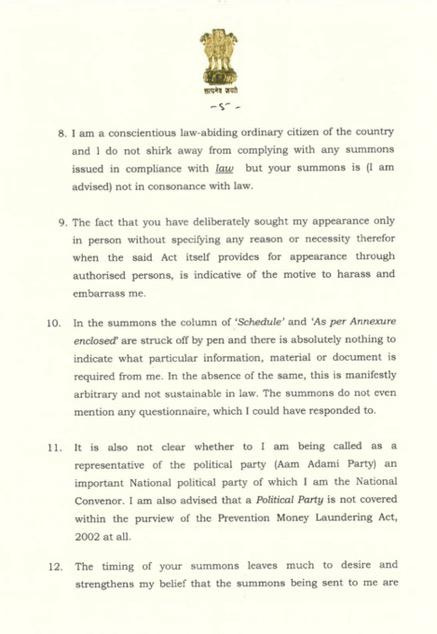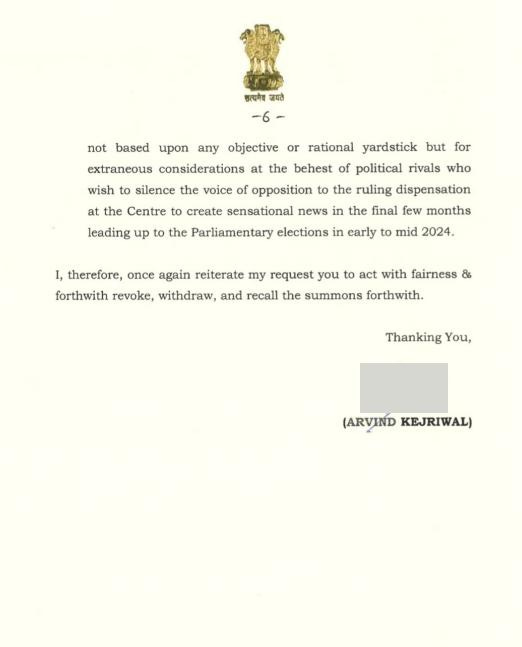Arvind Kejriwal's Date with ED: 3rd January, 2024
Kejriwal-ED Summons Saga— Act III: 12 Legal Questions Curated, in Light of Fresh Legal Process.
Kejriwal's Continued Standoff with ED: A Timeline of Events
Ignoring the detailed letter dated 20th December 2023 from Delhi Chief Minister Arvind Kejriwal, the Enforcement Directorate (ED) has issued fresh summons for him to appear in person on the 3rd of January 2024. This latest development in the ongoing saga comes after Mr. Kejriwal's expressed inability to comply with the earlier summons for 21st December 2023, citing his long-standing commitment to his annual Vipassana meditation camp till 30th December 2023, a practice that he has maintained for the past 25 years.
Kejriwal's Response to ED: A Detailed Examination
In his response to the ED's summons for his personal appearance on December 21, presumably linked to the Delhi Excise Case, the Delhi Chief Minister and Aam Aadmi Party National Convener, Shri Arvind Kejriwal, had sent a comprehensive 6-page letter to the central agency. This letter, now widely circulated and available on social media platforms, is reproduced at the end of this article for our readers' convenience. In this communication, Mr. Kejriwal not only reasserts the position he took in his earlier letter dated 2nd November 2023, written in response to the ED summons for 30th October 2023, but also brings up several additional legal and technical points for consideration.
Addressing Reader Queries on Kejriwal's ED Summons
Following the recent summons for Arvind Kejriwal to appear before the ED on January 3, 2024, many of our readers have expressed their curiosity and concerns, posing several pertinent questions. While we do not possess specialized expertise in legal matters, particularly concerning the Prevention of Money Laundering Act (PMLA), 2002, we have endeavored to compile responses to some of these inquiries. To ensure a comprehensive and informed perspective, we have consulted with several legal experts, including retired officials from the Enforcement Directorate and CBI, and have also conducted our own independent research.
With this groundwork, let's attempt to address some of the frequently raised questions.
1. Prospects of ED Responding to Kejriwal's Communications
Question: Will the Enforcement Directorate formally address the concerns raised by Mr. Kejriwal in his prior communications?
Answer: It is highly unlikely, bordering on improbable, that the ED will engage in any form of detailed written reply to Mr. Kejriwal's communications at this stage. The issuance of the most recent summons for January 3, 2024, serves as a clear indication of the ED's intention to avoid entering into a written dialogue on the matters raised before a formal statement is recorded. It is generally understood that any preemptive response might open up avenues for legal contestation, which the agency prefers to avoid. Therefore, it continues to utilize the summons under section 50 of the PMLA as a compelling mechanism to ensure the presence of individuals whose testimony is considered crucial for the ongoing inquiry or investigation.
2. Clarifying Kejriwal's Capacity in ED Summons
Question: If the matter escalates to Court, what stance will the ED adopt regarding Mr. Kejriwal's status in the summons — whether as Chief Minister of Delhi, a private citizen, or as the National Convenor of the AAP?
Answer: Should such specifics be queried during potential future legal proceedings, the ED is likely to maintain that an individual is summoned in all capacities they embody. Thus, for the purposes of the summons, whether Mr. Kejriwal provides information as the Chief Minister of Delhi, as the National Convenor of the AAP, or as a private citizen is immaterial. The underlying principle is that the individual—being the same in any capacity—is obligated to respond truthfully to the inquiries posed by the ED, leveraging its statutory authority. This approach underscores the notion that the responsibilities and knowledge of a person are inseparable from their various public and private roles.
3. Clarification on Summoned Individual's Status by ED
Question: Should the Enforcement Directorate specify whether a person is being summoned as an accused, a suspect, or merely a witness?
Answer: Legally, there is no mandate requiring the ED to explicitly declare the capacity in which a person is being summoned at the outset of their inquiry or investigation. The prevailing approach within the Enforcement Directorate is that determining the exact status of an individual—whether as an accused, a suspect, or a witness—would be premature and assumptive while the investigation is ongoing. Initially, the agency summons the individual, poses pertinent questions, and assesses the responses in conjunction with the evidence it has already gathered. As the inquiry progresses, the Enforcement Directorate then makes a more informed determination about the individual's status, based on the evolving understanding of their involvement and the available evidence. This method allows the investigation to adapt dynamically to the findings and evidence as they emerge.
4. Determining Accusation Status in ED Proceedings
Question: Does an individual become aware of their status as an accused at any point during the inquiry or investigation after responding to ED's summons?
Answer: The most definitive indicator that an individual is being considered an accused by the ED is their formal arrest. Upon arrest, the agency is legally bound to provide the grounds of arrest in writing within 24 hours. In other scenarios, if a person is summoned, questioned, and then allowed to leave without arrest, there remains ambiguity for the individual regarding their status. Even if they are summoned repeatedly without arrest, there is no clear indication provided to them about whether they have been exonerated or might still be considered for accusation in the future. The absence of an arrest doesn't necessarily equate to a clean chit, leaving the individual in a state of uncertainty about their standing in the ongoing investigation.
5. Implications of Exclusion from ED's Charge Sheet
Question: If a formal complaint or chargesheet is filed before the Special PMLA Court and an individual's name does not appear as an accused, does that signify that the ED has exonerated them?
Answer: If an individual's name is absent from the accused list in the formal complaint or chargesheet filed before the Special PMLA Court, it strongly suggests that they are not being treated as an accused. Particularly, if the person is listed as an official prosecution witness, it serves as further confirmation of their non-accused status; constitutional safeguards prevent a person from being compelled to testify against themselves. However, it's important to note the practice wherein the ED may submit an initial charge sheet stating that the investigation is ongoing and subsequent chargesheets may be filed. In such cases, the absence of an individual's name in the initial document does not guarantee that they won't be included as an accused in later filings. This ongoing nature of the investigation means that a definitive conclusion about one's status may not be possible until the entire process is conclusively completed.
6. Trial Proceedings from Multiple Charge Sheets in PMLA Cases
Question: In cases where multiple criminal complaints and charge sheets arise from the same Enforcement Case Information Report (ECIR), will the trial proceed separately for each, or is there typically a single trial after all related documents are submitted, indicating the conclusion of the investigation?
Answer: Generally, the legal expectation is that charges will be framed only after all criminal complaints and charge sheets related to the same ECIR have been presented to the Court. This approach promotes coherence and comprehensive adjudication of all related allegations and evidence. However, there isn't an absolute rule in this regard. If a distinct and independent offence of money laundering is identified, nothing legally prevents the prosecution or the Enforcement Directorate from seeking separate trials for these particularities. Such requests, though uncommon and unusual, are not beyond legal feasibility but would likely provoke additional litigation and procedural deliberation to ensure the fairness and integrity of the trial process. Each case's unique circumstances and the judicial discretion involved play a significant role in determining whether separate or combined trials are pursued.
7. ED Jurisdiction and Accusation Criteria in PMLA Cases
Question: Is it true that the Enforcement Directorate's jurisdiction over an individual begins only if they are named in a regular FIR or summoned as an accused by a criminal court in respect of the scheduled offences? How can the ED then possibly name Mr. Arvind Kejriwal as an accused under PMLA laws when he is not listed as an accused in any CBI FIRs or chargesheets?
Answer: The prevailing legal understanding is indeed that ED's jurisdiction typically activates when an individual is named in a regular FIR or is involved in a court-summoned case regarding scheduled offences. However, there are judicial interpretations suggesting that money laundering can be treated as an independent offence, which can be pursued even if the individual has not been formally charged with a scheduled predicate offence. This perspective posits that the ED might have grounds to name someone as an accused under PMLA independent of their status in associated CBI proceedings. Nonetheless, this is a highly debated and legally complex area, often leading to extensive and contested litigation. Should the ED opt to name an individual as an accused exclusively under PMLA statutes without them being named in relevant CBI charge sheets, it would likely result in rigorous legal challenge and scrutiny.
8. Potential Consequences of Non-Compliance with ED Summons by Arvind Kejriwal
Question: What are the possible repercussions if Mr. Arvind Kejriwal fails to appear before the ED on January 3, 2024?
Answer: If Mr. Kejriwal chooses not to comply with the ED summons set for January 3, 2024, it's probable that the ED would first re-issue another summons as a further step to demonstrate procedural diligence and avoid any appearance of undue haste in its coercive actions. This approach allows the agency to document a pattern of non-compliance before escalating the matter.
Should there continue to be non-compliance, while the ED does possess the authority to arrest individuals under certain conditions, in high-profile cases like this, a direct move to arrest is often seen as unlikely. A more anticipated course of action would be for the ED to petition the Special PMLA Court for the issuance of either bailable or non-bailable warrants. This legal measure aims to compel Mr. Kejriwal's attendance before the investigating officer to address the inquiry's questions. Each step taken by the ED in this context would be closely watched and carries significant legal and political implications.
9. ED's Approach to Questioning in High-Profile Cases
Question: Given that much of the information sought by the ED is already on record, why does the agency not simply provide Mr. Kejriwal with a questionnaire, allowing him to consult relevant documents and respond in writing?
Answer: The Enforcement Directorate typically maintains that providing a questionnaire in advance could inadvertently reveal their investigative strategy and enable the individual being questioned to prepare evasive or strategic responses. The nature of interrogations often requires the ability to adapt questions based on the responses received, maintaining an element of unpredictability that can be crucial for uncovering the truth or inconsistencies in statements. By not disclosing their line of questioning beforehand, the ED aims to preserve the integrity and effectiveness of their inquiry process. This method ensures that witnesses or suspects do not have the opportunity to tailor their responses in a way that could potentially undermine the investigation's objectives.
10. Addressing the Absence of Annexures in ED Summons
Question: How should one interpret Mr. Kejriwal's remark about the annexure being struck off as blank in the context of the ED summons?
Answer: Typically, annexures in ED summons include a set of standard questions seeking basic personal and financial information such as bank account details, passport number, Aadhaar card number, etc., to form a comprehensive profile of the witness or suspect. This practice is intended to streamline the process by having all necessary information readily available, avoiding delays during the questioning. If such annexures are left blank or omitted, it could indicate that the ED is not prioritizing the collection of this generic information in this particular case. Instead, the agency might be focusing on specific aspects of the inquiry, such as the formulation, implementation, and rollout of the excise policy in question. The absence of detailed annexures suggests a more targeted line of questioning aligned with the unique priorities and strategies of the ongoing investigation.
11. Assessing Money Laundering Allegations Involving Political Parties
Question: How valid is Mr. Kejriwal's assertion that a political party cannot commit an offence of money laundering, as referenced in his communication?
Answer: The Prevention of Money Laundering Act (PMLA), 2002, does not provide specific immunity to registered or recognized political parties from being implicated in money laundering offenses. While certain immunities might apply to the donations received through electoral bonds by eligible recognized political parties, these do not extend to all financial activities. If a political party, as a corporate entity, is involved in activities that fit the definition of money laundering under the PMLA, then both the entity and the individuals in charge can be held accountable. The law makes no explicit exceptions for political parties, meaning they are subject to the same scrutiny and legal consequences as any other entity if involved in money laundering offenses. It is crucial for all organizations, including political parties, to adhere to the legal framework governing financial transactions to avoid implications of money laundering.
12. Legal Options for Kejriwal if Further ED Action is Taken
Question: What legal avenues are available to Mr. Kejriwal if the ED reissues a summons or if bailable or non-bailable warrants are issued by the competent PMLA court, particularly if he fails to attend the summons scheduled for January 3?
Answer: Should such a scenario unfold, Mr. Kejriwal has several legal options at his disposal:
Comply with the Summons: He could choose to appear before the ED to respond to their questions, or formally record his legal objections in response to the queries.
Judicial Intervention: He has the option to invoke the writ petition jurisdiction of the Delhi High Court to seek the quashing of the summons or warrants.
Seek Anticipatory Bail: Mr. Kejriwal could apply for anticipatory bail before appearing in person in response to the summons or prior to the execution of any warrants. It's important to note that the criteria for granting anticipatory bail in PMLA cases are quite stringent and narrowly defined.
These actions would represent different strategies in navigating the legal complexities of the situation, each with its own set of considerations and potential outcomes. The choice of action would depend on various factors, including legal advice, the nature of the charges or allegations, and the broader political and legal context.
Conclusion: Awaiting the Outcome of Kejriwal's Legal Battle
The ongoing narrative of Arvind Kejriwal's summons, set against the backdrop of three associated individuals, including two former ministers, either in custody or on interim bail, has garnered widespread attention. As the situation evolves, all eyes are intently focused on how the proceedings will unfold. The precedents set by the Courts in this matter will have significant implications, influencing not only the broader political landscape but also future cases where individuals are summoned by the Enforcement Directorate. These individuals often seek clarity on the grounds of their summons and the justification for their required testimony. The outcome of this case will, therefore, be a critical reference point for similar scenarios, shedding light on the balance between legal authority and individual rights. As the legal and political drama continues, observers and stakeholders alike await the developments with keen interest.
Stop Press
A 7-Judge Supreme Court Bench to hears pleas challenging validity of amendments to Prevention of Money Laundering Act, 2002— passed as Money Bills since 2015— on January 30, 2024.
The outcome of this case in the Apex Court could have a material bearing on the current proceedings and many other pending cases, especially with reference to bail and framing of charges.



